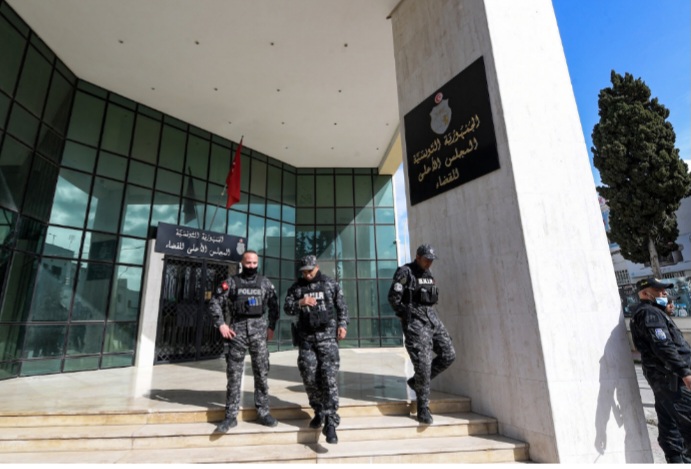By Nosmot Gbadamosi
Tunisia, hailed as the last bastion of Arab Spring democracy, is teetering toward national bankruptcy. State salaries were delayed in January against the backdrop of slow negotiations with the International Monetary Fund (IMF) on a bailout. Tunisia’s debts have soared to nearly 100 percent of the country’s GDP.
Amid high unemployment and a worsening economic situation, Tunisians in 2021 topped the list of nationals arriving in Europe by crossing the Mediterranean Sea. Some 51 percent of people ages 18 to 29 say they are constantly thinking about migration, according to research by International Alert Tunisia.
Those who are leaving are not politically motivated. But Tunisian President Kais Saied is one symptom of a larger problem. The violent arrests of Saied’s critics have been widely regarded as reminiscent of the tactics of former Tunisian dictator Zine el-Abidine Ben Ali, who was ousted after the 2011 revolution.
Judges in Tunisia had their offices locked by police on Monday, a day after Saied dissolved the Supreme Judicial Council, the body ensuring judicial independence, in a move described by detractors as an attempt to weaponize the courts. Tunisia’s International Commission of Jurists warned in December 2021 that Saied’s intervention amounted to an attack on “the last remaining line of defence against the President’s power grab.”
On July 25, 2021, Saied plunged the country into crisis by dissolving parliament and granting himself executive powers on the grounds of “imminent peril”—an exceptional measure in the country’s 2014 constitution. He extended those powers indefinitely on Aug. 25, in what critics called a “presidential coup.” Opinion polls showed Saied’s intervention was largely supported by Tunisians who saw it as a means of ending corruption.
“The rejection of parliament, above all, reflects the rejection of all those who controlled this body and who have only reproduced, or even aggravated by their policies, mass unemployment, social inequalities, and regional disparities,” Olfa Lamloum, country director for International Alert Tunisia, told Foreign Policy.
In recent months, as tensions between Saied and Tunisia’s political ranks escalated, a number of opponents from the biggest group in parliament, the Islamist Ennahda Movement, have been accused of wrongdoing and placed under house arrest.
Last month, an anti-Saied protester, Ridha Bouziane, died and many others were violently arrested by police during demonstrations that defied a COVID-19 ban on public gatherings. The ban was extended on Jan. 26, a move decried by critics as an effort to stifle dissent.
Under pressure from the IMF, Saied announced a political road map in December 2021 and vowed to organize a national dialogue. The election of a new parliament would not come until the end of the year. Only 6 percent of Saied’s election promises had been fulfilled, according to a Oct. 25 review by I Watch.
“In a way, the country has slid back into some form of authoritarianism,” Youssef Cherif, a political analyst and director of the Columbia Global Centers in Tunis, Tunisia, told Foreign Policy. Tunisia could continue on that path or go the way of countries that have experienced outright military coups elsewhere in Africa.
Advocates of democracy have urged foreign diplomats to rein in the influence of external actors such as the United Arab Emirates, Saudi Arabia, and Egypt. Those countries “use a lot of their influence on at least the media and on social media to push Tunisians away from democracy and to portray democracy as something completely useless,” Cherif said. If Tunisia’s democracy fails and authoritarian rule returns permanently, it would be a symbolic end to the Arab Spring revolution.
Credit | Foreign Policy

